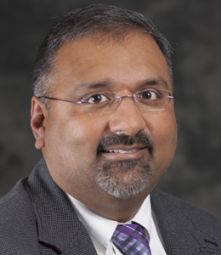Widener Receives $1.35 Million for Opioid Treatment Training

Sanjay Nath, a professor in Graduate Clinical Psychology, was awarded a three-year, $1.35 million in grant funding through the Health Resources and Services Administration (HRSA) to launch an integrated care treatment program for individuals who battle Opioid Use Disorder (OUD) and Substance Use Disorders (SUD).
"In cities and towns across the United States, the opioid epidemic has left a devastating trail of loss and addiction that has impacted the lives of families and the health of our communities," said Nath. "This funding will enable us to focus on community-based, interdisciplinary training that will prepare students with the high-impact learning experiences needed to address one of our nation’s most vexing problems."
The grant, which is the largest of its kind awarded at Widener, will fund clinical psychology, social work, occupational therapy, and nursing students, as well as faculty from these disciplines, to work in partnership with community agencies.
“On behalf of the Widener community, I extend my congratulations to Dr. Nath on securing this federal grant and contributing to the effort to confront one of the leading public health crises in the United States,” said President Julie E. Wollman. “This experiential training and interdisciplinary approach to learning will connect graduate students with meaningful, high-impact practices that prepare them to enter the health care field and positively impact the opioid epidemic.”
According to the U.S. Department of Health and Human Services (HHS), approximately 11.4 million people misused prescription opioids in 2017. Pennsylvania is experiencing a major OUD, SUD and overdose crisis. Data collected in 2017 identified the state as having the third-highest rate of overdose in the U.S. at 44.3 per 100,000 people, a statistic double the national average. That same year approximately 5,500 Pennsylvania residents were lost to overdose. Within the state, Delaware County has been particularly impacted by the opioid and overdose crises with the highest number of overdose reversals in 2017.
The widespread nature of the crisis has demonstrated the need for coordinated, immersive, and interdisciplinary training. - Sanjay Nath
The program will employ an integrated care model, which is shown by research to be a best practice for treating an epidemic and achieving inter-professional teamwork and learning outcomes. By working with professionals across various disciplines, the students will learn how to coordinate medical, physical, social, and mental health services. Similarly, they will learn how to address the multiple issues and needs often associated with individuals struggling with addiction including chronic illness, housing insecurity, incarceration, interpersonal violence, and employment.
The grant is part of HRSA’s Opioid Workforce Expansion Programs for Professionals and Paraprofessionals that is aimed at expanding the pipeline of professionals who gain exposure to OUD and SUD treatment. Providing students with this kind of hands-on learning will not only enrich their academic experiences but encourage a career dedicated to addressing these problems within high-need, high-demand communities.
“Students will learn about the challenges faced by, and the rewards of, those overcoming addiction from clinical faculty and supervisors who treat these disorders with medication-assisted treatment,” Nath added. “This training opportunity will position students to be on the front lines in communities of need to work and aid our region and country in addressing this epidemic.”
This project funding is supported by the Health Resources and Services Administration (HRSA) of the U.S. Department of Health and Human Services (HHS) as part of an award totaling $1.35 million with zero percentage financed with nongovernmental sources. The contents of this statement are those of the author(s) and do not necessarily represent the official views of, nor an endorsement, by HRSA, HHS or the U.S. Government.



